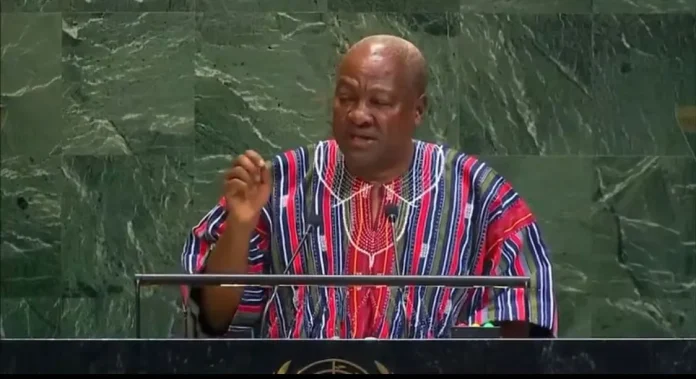Our Terms & Conditions | Our Privacy Policy
Mahama Launches “Accra Reset” Initiative at UN Assembly
President John Dramani Mahama
President John Dramani Mahama launched “The Accra Reset: Reimagining Global Governance for Health and Development” during the 80th United Nations General Assembly, positioning Ghana as a leader in advocating for comprehensive reform of international financial systems that he argues systematically disadvantage African nations.
Speaking to world leaders on Thursday, September 25, 2025, President Mahama called for fundamental restructuring of global financial architecture, declaring that Africa must gain greater representation in multilateral financial institutions to address what he described as inherent systemic inequities.
The Ghanaian leader, serving as African Union Champion for African Financial Institutions, used his platform to demand not only United Nations Security Council reforms but complete reset of financial mechanisms that currently burden African countries with disproportionate debt servicing costs.
“The Accra Reset” represents a bold new framework to reimagine global governance architecture, focusing specifically on health and development priorities that align with African continental needs and emerging economy requirements.
Mahama’s intervention addresses growing continental frustration with financial arrangements that critics argue perpetuate dependency relationships between African nations and Western creditor institutions. The president emphasized that current systems prioritize debt servicing over essential social infrastructure investments.
During his address, Mahama highlighted Ghana’s rapid economic recovery, noting inflation reduction from 23.8 percent in December 2024 to 11.5 percent in August 2025, demonstrating domestic policy effectiveness despite challenging global financial conditions.
The “Accra Reset” initiative seeks to address what analysts describe as punitive borrowing conditions facing African governments, including elevated interest rates justified by so-called “Africa risk premiums” that persist regardless of economic reforms or stabilization efforts.
Continental debt servicing costs have reached levels where many African countries allocate more resources to creditor payments than combined health and education budgets, according to development finance experts. This pattern undermines long-term human capital development and infrastructure modernization across the continent.
Ghana’s experience reflects broader African challenges, where scarce government revenues flow to bondholders in international financial centers rather than domestic development priorities including hospitals, schools, roads, and industrial capacity building.
The president’s call echoes similar reform demands from international financial institutions including the International Monetary Fund (IMF), World Bank, and African Development Bank (AfDB), all of which have acknowledged current arrangements inadequately serve low- and middle-income countries.
Recent IMF analysis titled “IMF and the Future of the Global Financial Architecture” coordinated by the Africa High-level Working Group specifically calls for reimagined global financial systems better serving developing nations. The report aligns with Mahama’s reform advocacy and continental institutional priorities.
The AfDB has championed Special Drawing Rights (SDR) reallocation through regional development banks to direct additional resources toward African countries while strengthening institutional capacity for enhanced development finance delivery.
World Bank leadership has engaged in parallel discussions around adjusting global financial mechanisms for greater inclusivity and responsiveness, particularly through collaboration with the IMF and United Nations Economic Commission for Africa (UNECA).
Mahama’s UN address also addressed Cuba blockade removal and reparations for slavery and colonialism, positioning his reform agenda within broader global justice frameworks that address historical inequities.
The president argued that Africa’s growing demographic significance and economic potential justify enhanced representation in global decision-making institutions that currently reflect outdated power distributions favoring established Western economies.
His reform advocacy comes as Africa increasingly serves as a catalyst for human potential, development, economic reform, and ecological stability, according to continental development assessments highlighting the region’s strategic importance for global sustainability.
The “Accra Reset” framework represents Ghana’s most ambitious international leadership initiative since independence, leveraging the country’s stability and democratic credentials to advocate for continental interests at the highest levels of global governance.
Success of Mahama’s reform agenda will depend on building coalition support among African nations, sympathetic developed countries, and international organizations already acknowledging current system inadequacies for contemporary development challenges.
The initiative positions Ghana as a potential leader in South-South cooperation mechanisms while advocating for institutional changes that could benefit emerging economies beyond the African continent.
Whether the “Accra Reset” generates sufficient international momentum for meaningful financial system reforms remains uncertain, but Mahama’s UN platform has elevated African voices in critical global governance debates affecting billions of people worldwide.
Images are for reference only.Images and contents gathered automatic from google or 3rd party sources.All rights on the images and contents are with their legal original owners.



Comments are closed.